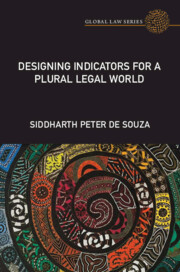Book contents
- Frontmatter
- Dedication
- Contents
- Acknowledgements
- 1 Introduction
- 2 ‘Meanings’, ‘Trust’ and ‘Power’: Critical Perspectives on Legal Indicators
- 3 Rule of Law Promotion, Legal Indicators and Legal Pluralism
- 4 Epistemic Diversity and Voices from the Global South: Countering the Managerial Implications Of Measuring Justice
- 5 A Capability Approach to Access to Justice in Plural Legal Systems
- 6 Conclusion
- Appendix
- Bibliography
- Index
2 - ‘Meanings’, ‘Trust’ and ‘Power’: Critical Perspectives on Legal Indicators
Published online by Cambridge University Press: 29 July 2022
- Frontmatter
- Dedication
- Contents
- Acknowledgements
- 1 Introduction
- 2 ‘Meanings’, ‘Trust’ and ‘Power’: Critical Perspectives on Legal Indicators
- 3 Rule of Law Promotion, Legal Indicators and Legal Pluralism
- 4 Epistemic Diversity and Voices from the Global South: Countering the Managerial Implications Of Measuring Justice
- 5 A Capability Approach to Access to Justice in Plural Legal Systems
- 6 Conclusion
- Appendix
- Bibliography
- Index
Summary
In late 2017, India climbed a sharp 30 places in the World Bank's Ease of Doing Business rankings. The rankings were discussed and celebrated as testament to the manner in which the Indian government, under Prime Minister Narendra Modi, had effected policy change to improve the trade, tax and economic climate in the country. The prime minister himself tweeted that it was the outcome of a multi-sectoral reform agenda of his government. A few months later, the Centre for Global Development (CGD) produced a study, which stated that India's rise in the rankings was closely related to a change in the methodology adopted by the World Bank rather than a result of sustained reform in India. This study closely followed a rare admission by the former World Bank chief economist Paul Romer, who questioned the integrity of the Ease of Doing Business ranking, which he argued had been politically motivated. He spoke, in particular, of the case of Chile where the ranking appeared to favour Sebastian Pinera over Michele Bachelet in the presidential race.
The CGD also showed that the fall in rankings of Chile during the time of Bachelet was due to methodological tinkering and not an outcome of any laws or policy changes by the government. On recreating the Ease of Doing Business ranking using a consistent methodology and fixed sample of countries from 2006–2019, the study showed that the performance in Chile had in fact not been as volatile as in the official ranking.
In both the instances of India and Chile, the rankings were seen as objective measures, backed by the influence of the World Bank. They were then used by political actors and rivals as election planks to dismiss rival political visions, performances and abilities to reform. The reasons for their use were that the rankings produced a sense of authenticity and certainty about the state of the country at that point in time. It provided a justification for making sense of the otherwise nebulous concept of ‘ease of business’ by creating criteria that could form a set of rankings. These cases illustrate how the use of numbers in the form of indicators have the power to tell stories, build narratives and affect changes in behaviours—a matter that will be investigated further in this chapter.
- Type
- Chapter
- Information
- Designing Indicators for a Plural Legal World , pp. 20 - 50Publisher: Cambridge University PressPrint publication year: 2022

